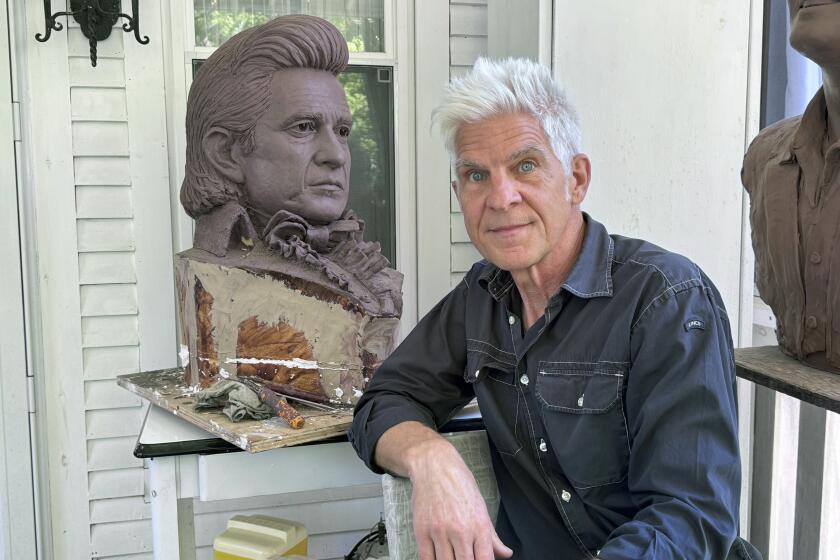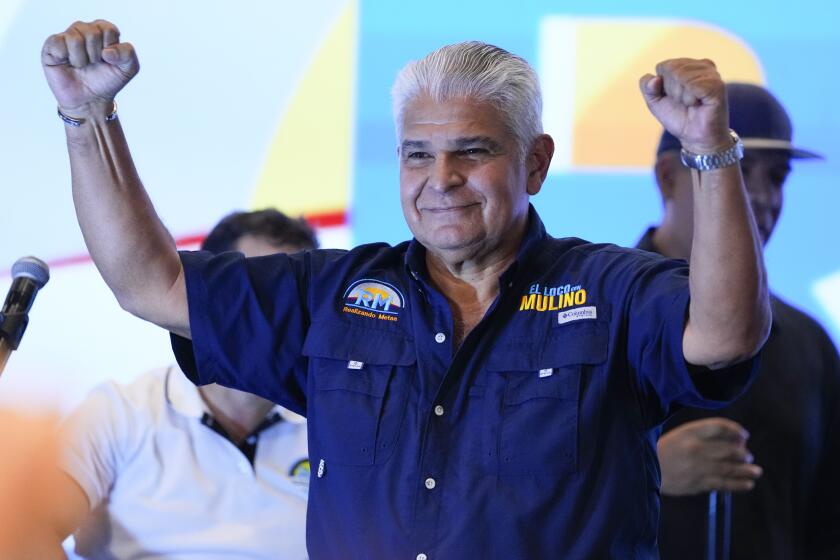Factions Reach Agreement in Ecuador Crisis
The political crisis that gave Ecuador three competing presidents appeared to be nearing an end early today as the vice president, Congress and armed forces reached an agreement for a peaceful transition of power.
Details of the agreement were not immediately available. But the consensus appeared to end elected President Abdala Bucaram’s bid to stay in power. On Saturday, this country’s influential armed forces had withdrawn its support from him and assumed an active role in solving the political crisis.
The Joint Chiefs of Staff met separately with Vice President Rosalia Arteaga, who has declared herself president, and with leaders of the Congress, who Thursday had declared Bucaram mentally incompetent and named Fabian Alarcon interim president.
Military leaders recognized the congressional decision to oust Bucaram but refused to support a successor.
“This would be a civilian dictatorship,” Bucaram charged during a news conference in the port of Guayaquil, where he went after violent demonstrations in Quito on Friday.
“The armed forces are not a constitutional tribunal,” he said. “They have no reason to name the president. The president is designated by the constitution.”
Also Saturday, dripping wet from rain and in shirt sleeves, Bucaram had called for supporters to launch a general strike Feb. 19 unless his two rivals for the presidency join him in talks Wednesday to resolve the constitutional crisis.
The political maneuvering met with public indifference as shops closed early for the four-day Carnaval holiday and people gathered in city parks and the cafes along Avenida Rio Amazonas, Quito’s main boulevard.
“This is what always happens in Ecuador,” said street vendor Manuel Rames, 55. “It’s the same old politicians fighting for power.”
Despite Bucaram’s threats, the possibility that the popularly elected but increasingly unpopular president--known as “El Loco,” the Crazy One--will continue in power appeared increasingly less likely, analysts said. “Bucaram is out,” Freddy Ellers, a longtime political rival, flatly stated.
Four Cabinet ministers, including Defense Minister Victor Bayas, a retired general, had resigned since Thursday.
Still, whether the eccentric Bucaram, Arteaga or Alarcon ultimately sits in the presidential palace, Ecuadoreans predicted little difference in their country’s future.
“These political problems are distractions that hurt the country’s image but that do not mean profound social or political change,” said Miguel Yanez, a 38-year-old artist. “We are puppets of the great powers. We are drowning in debt, and the international framework does not allow any leader to carry out his intentions.”
Bucaram has drawn fire during his six-month term for what many view as his odd behavior, such as singing off key at his inauguration and dancing on stage with scantily clad showgirls.
However, analysts suggested that Bucaram’s economic incompetence--as much as his alleged mental incompetence--was behind the pressure to throw him out.
Ecuador is deeply in debt and struggling to enter the global trading system far later than most of Latin America. This country has capitalized on its natural beauty and diversity--from the Galapagos Islands to the colonial highlands to the Amazon--to attract tourism, but it has few sources of exports.
“The country’s real problem--far more important than who is president--is its limited economy that cannot finance production,” said economic analyst Enrique Macias Chavez.
Bucaram’s predecessor negotiated a reduction in the country’s $13.2-billion foreign debt, but the current level of payments still absorbs half the federal budget. Ecuador is $60 million behind in payments on its $2-billion Paris Club debt--money owed to foreign governments.
High interest rates have held back Ecuador’s economic growth, analysts said. The economy is expected to have expanded by 2.9% last year, slightly better than the 2.3% rate in 1995. Still, with the population growing at 2% annually, per capita economic growth is negligible.
Even before the political crisis, the country had failed to meet its commitments to the World Trade Organization. And Bucaram, under pressure from demonstrations against an economic austerity plan, was thought to be on the brink of reneging on economic reforms promised to the International Monetary Fund.
If Bucaram is deposed, his replacement will face the same economic problems--without any real base of popular support. Arteaga and Alarcon both rose to influence on Bucaram’s coattails and were his close allies until recently.
Alarcon effectively turned his political weakness into political strength, analysts say. With just two seats in Congress, his tiny Alfarista Front, named for a turn-of-the-century reformer, should by all rights be sitting on the sidelines as the major parties debate Ecuador’s fate.
Instead, Alarcon is center stage because he managed--initially with Bucaram’s help--to play the major parties against each other and to achieve power by persuading them that he represented no threat.
Still, some analysts believe that Alarcon has risen as high as he can go. A march to the presidential palace Friday, which was turned back by police, was his best shot at power, they said. “He played his trump card and lost,” said one.
Now, some observers believe, the military and the Social Christian Party--a crucial ally in Alarcon’s bid to replace Bucaram--will persuade him to allow the president to resign and hand over power to Arteaga, the vice president.
At the same time, leaders of Bucaram’s party are thought to be pressuring him to resign by threatening to investigate allegations of corruption in his administration, starting with rumors about the sudden wealth of his teenage son.
More to Read
Start your day right
Sign up for Essential California for news, features and recommendations from the L.A. Times and beyond in your inbox six days a week.
You may occasionally receive promotional content from the Los Angeles Times.






